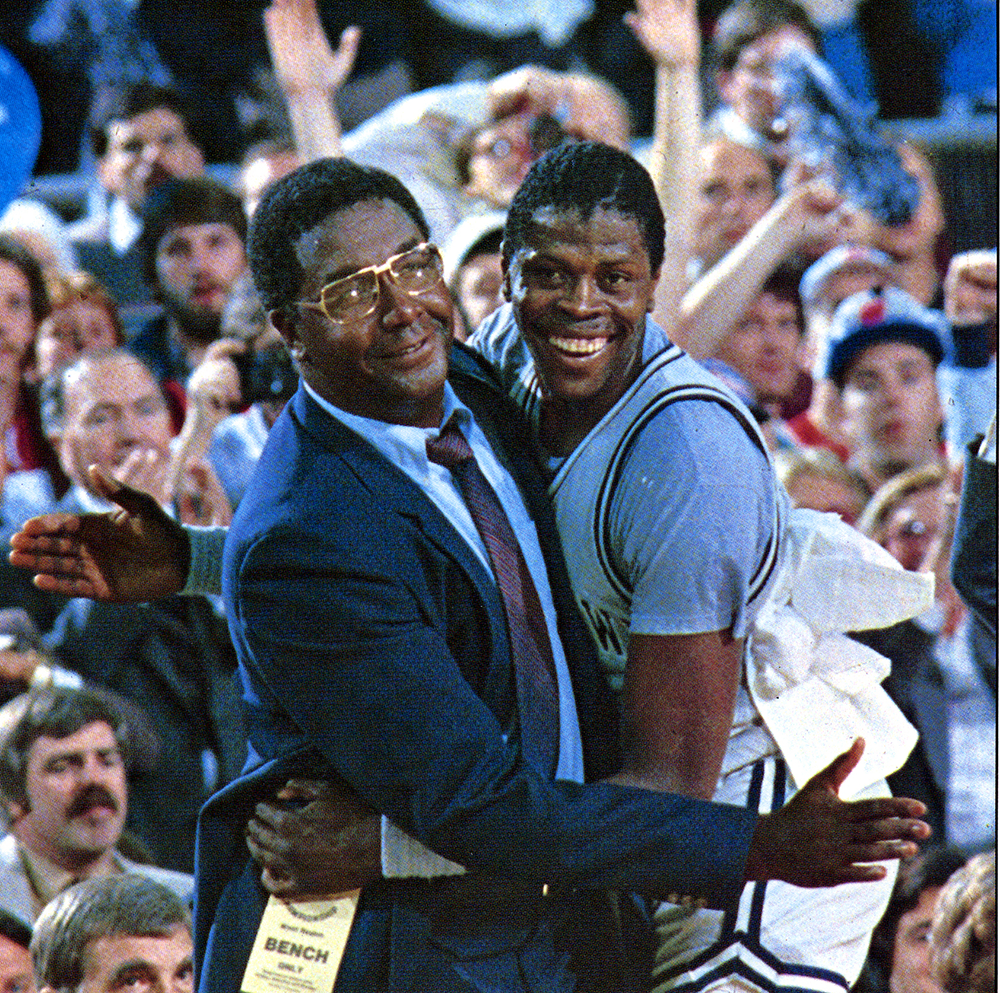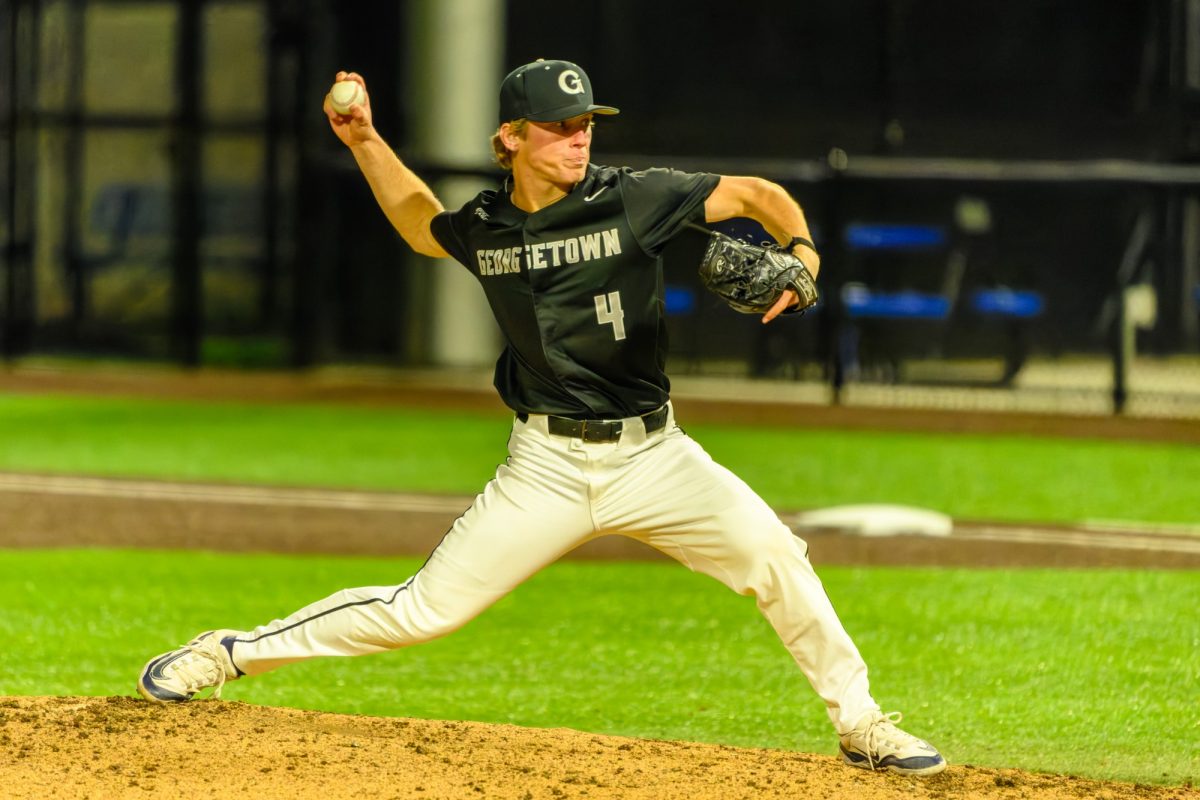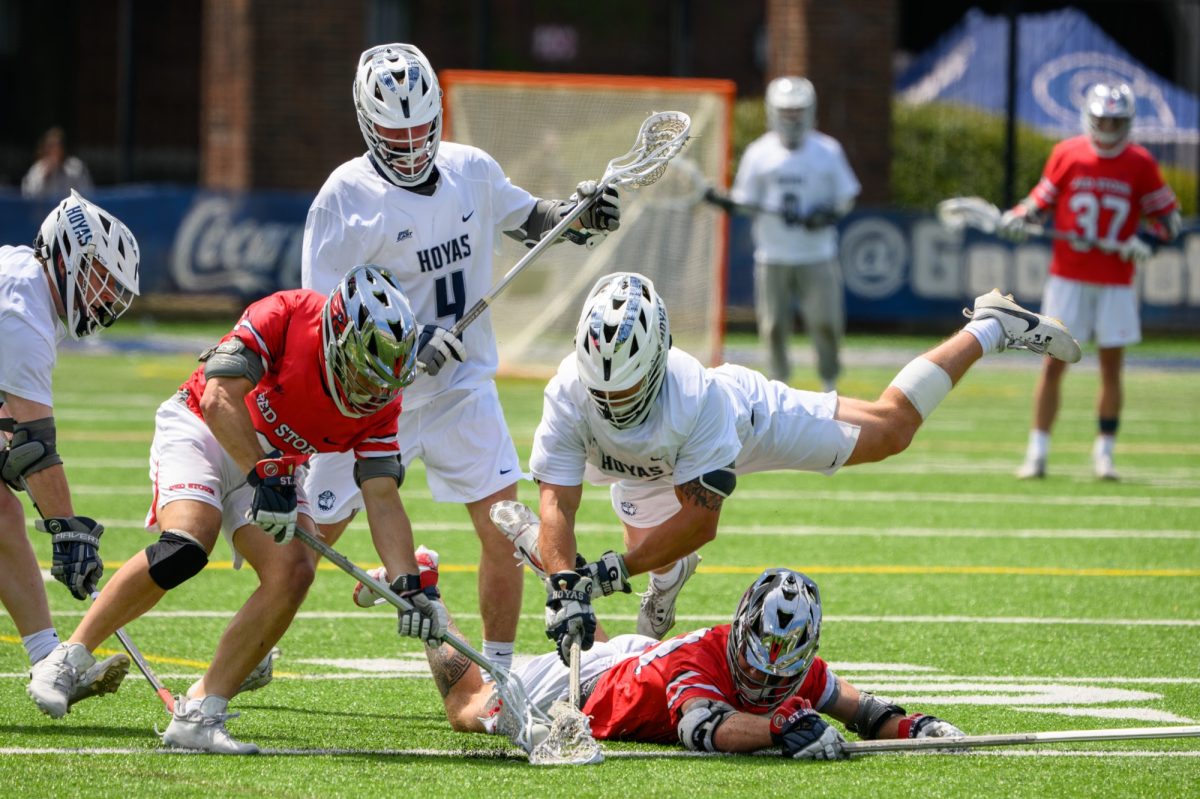Famed Georgetown University basketball coach John Thompson Jr. died of unknown causes Aug. 30 at age 78. During his illustrious basketball coaching career, Thompson became the most decorated coach in Georgetown basketball history, clinching the Hoyas’ first national title in 1984, as well as three Final Four appearances and seven Big East titles. Thompson, considered a trailblazer for his racial and social justice advocacy, was also the first Black coach to win an NCAA basketball national championship. Former players and colleagues remember him as loyal, strong and a fierce advocate for change.
Thompson was born Sept. 2, 1941, in Washington, D.C. Known for his towering stature, Thompson rose to basketball prominence during his high school career as a center at Archbishop Carroll High School. During his senior year of high school, he led his team to a 24-0 performance and finished as the top scorer of the Washington Catholic Athletic Conference. His basketball prowess earned him a scholarship at Providence College. As a Friar, Thompson played for Providence College’s first NCAA tournament team in 1964. He graduated as the all-time leader in points, scoring average and field goal percentage for the university.
“Coach Thompson was a pioneer whose impact extended far beyond basketball,” Providence head basketball coach Ed Cooley said in a statement for the Providence Friars website. “His message was always real and authentic as his passion was helping people be better,”
After graduating from Providence, Thompson spent two seasons playing in the NBA for the Boston Celtics. Thompson backed up star center Bill Russell, winning two consecutive NBA championships in 1965 and 1966 before retiring in 1967 to focus on a more promising coaching career.
From 1966 to 1972, Thompson served as the head coach of St. Anthony High School in Washington, D.C., before accepting the job to become Georgetown’s head coach in 1972. Thompson would spend the rest of his Hall of Fame career leading the Hoyas during their most successful era in history.
During his tenure as Georgetown head coach, Thompson towered over many opposing coaches and players, making him an intimidating presence on the sidelines. Thompson was famous for his signature white towel thrown over his shoulder during games, as well as a propensity to go on long, at times profane, rants. Thompson’s passion was evident in the way he conducted himself on the court. In a 1990 game against Syracuse University, Thompson was ejected after three technical fouls, and he even waved to the crowd as he exited.
Thompson often faced criticism in his career and was the target of racist remarks, including from Georgetown students. Before a game against Dickinson College at McDonough Arena in 1975, students hung a banner from the rafters that referred to Thompson as a racial slur and called for his resignation.
As the first Black coach to win an NCAA championship title, Thompson was also one of the first Black NCAA basketball coaches to gain prominence on the national stage, paving the way for other Black coaches who followed.
When asked if he took pride in being the first Black coach to reach the Final Four in 1982, Thompson swiftly rejected the notion.
“I resent the hell out of that question. It implies that I’m the first Black man to be accomplished enough and intelligent enough to do this,” Thompson said in an interview with reporters. “It’s an insult to my race. There are plenty of others who could’ve gotten here if they’d been given the opportunity they deserved.”
Thompson was also not afraid to speak his mind. In 1989, he walked off the court before a game against Boston College in protest of Proposition 42, a new NCAA rule that would ban academically ineligible freshmen from receiving scholarships. Thompson believed it would unfairly target minority students.
Miami Heat President Eric Woolworth (CAS ’87, LAW ’91) noted how Thompson’s efforts around social justice inspired him and are particularly timely following nationwide protests following the police murder of George Floyd in late May.
“As a white student who spent seven years at Georgetown in the ’80s, he had a profound influence on me in terms of opening my eyes to the ways of the world and the experience of Black people being different from mine,” Woolworth said in an interview with The Hoya. “In fact, much of the way I have been processing what is happening in the country right now and part of what is driving my support of the Black Lives Matter movement both personally and professionally was shaped by Coach Thompson’s influence. He was obviously a great coach. He was also a towering figure in the fight to value Black lives as much as any other — a great man.”

Thompson will also be remembered for the Hall of Fame players he developed with whom he maintained a close rapport long after he retired from Georgetown. Thompson coached many of Georgetown’s most legendary players, including Alonzo Mourning (COL ’92), Dikembe Mutombo (SLL ’91), Allen Iverson and current Georgetown men’s basketball Head Coach Patrick Ewing (CAS ’85). Many of Thompson’s former players say Thompson’s encouragement influences their decisions even today.
“This is a person that, when I came to college — I was 18 — helped me to grow,” Ewing said during Big East Media Day in October 2019. “Even though my mom and dad were always there, he was always a person I could pick up the phone and call if I had a problem or a question.”
Since his death, players have posted tributes on social media, including Iverson, the 2001 NBA Most Valuable Player, who played for Thompson from 1994 to 1996.
“Thanks For Saving My Life Coach. I’m going to miss you, but I’m sure that you are looking down on us with a big smile,” Iverson tweeted. “I would give anything for just one more phone call from you only to hear you say, ‘Hey MF’, then we would talk about everything except basketball. May you always Rest in Paradise, where there is no pain or suffering. I will always see your face in my mind, hoping that I made you proud.”
In his tribute, Ewing said he hopes to honor Thompson’s legacy as the current head coach of Georgetown’s basketball team.
“He has done a great job of teaching us not only how to be great athletes but also great human beings. Now it’s my role, my responsibility, to keep doing those things to the kids I’m teaching,” Ewing said during a video call with reporters.
Hoyas not in the basketball program also took note of the ways Thompson inspired them outside their Georgetown careers. Philadelphia Eagles defensive coordinator Jim Schwartz (CAS ’88) noted how Thompson’s coaching style has influenced him in his career in the NFL.
“I learned so much about coaching from him: Be confident about your process, your formula needs to be your own, not what works from other coaches or programs, don’t yield to outside opinions or criticisms,” Schwartz said in an interview with The Hoya. “Every detail is important. My work-study job for three years was doing the laundry in the equipment cage at McDonough Gym. JT didn’t like the way we were folding the basketball uniforms, and we got a clinic on exactly how he wanted it done. Who would care about how his players’ uniforms were folded? Answer: John Thompson. And later I would find out that Bill Belichick also cared. That’s the reason that I cared about all those small details when I became a head coach.”
Ever after retiring from Georgetown, Thompson was still heavily involved with the program through his coach emeritus position. The three head coaches who have come after Thompson all had a relationship with him. Craig Esherick, who followed Thompson’s tenure in 1999, was an assistant to Thompson for 17 years. In 2004, Thompson’s son, John Thompson III, was named head coach for the Hoyas. And in 2017, Ewing took the helm of the Hoyas’ program, continuing Thompson’s legacy.
Above Thompson’s statue in the entrance hall to the Thompson Athletic Center reads his famous quote, “When I’m gone, if I can’t go to heaven, take me back to Georgetown.” While Thompson may never physically return to Georgetown again, his legacy will clearly outlive him.















